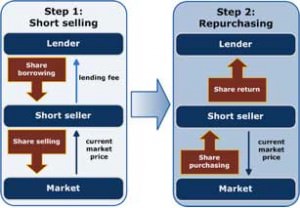What is short selling?
“Most of the time, you can hold a short position for as long as you want, but the downside is that interest is charged on margin accounts”
By Nicki Mossavarrahmani, Staff Writer
Short selling, shorting or going short; this is the financial practice of an intermediary borrowing an asset from a lender and then selling it to a third party on the market, in the hopes of making a profit from the variations of the borrowed asset’s worth.
Confused? Well, hopefully the following will clear up the basics.
The intention of the borrower (also known as the short seller) is to sell the lender’s assets at a higher price and then buy them back when they drop in price in the markets. The borrower is thus betting that the borrowed assets he/she sold will reduce in value in the long run, so that he/she can buy them back at a fraction of the cost they were sold for.
This idea works because the original lender will have all his securities (in this case, securities being the assets sold to third parties) returned, not the value of the securities (see the short selling infographic and examples below). And while the short seller may suffer from a loss if the price of the assets rises, the lender will experience a gain.
Example: Market conditions are such that the shares in company X are currently being traded at $10 per share.
Scenario 1: The short seller decides to borrow 100 shares, for a total value of $1000 and immediately sells those shares. If the price of the shares falls to $6, the short selling can buy the same number of shares back at the price of $600 (100 shares x $6). Once he returns the shares to the lender, the borrower has made a $400 profit, minus any borrowing fees.
Scenario 2: If the price of the shares in company X instead rises to $14 per share following the short sale, and the short seller is required to return the shares, the short seller would have to buy back 100 shares at $1,400 and would suffer from a loss of $400, plus any borrowing fees.
This example illustrates how investors can make a profit on a declining market by short selling an individual stock.
But you may ask, “why would a person lend his/her securities in the first place?”
Well, regardless of the change in price, the lender will receive a fee for borrowing the assets and payment of any dividends paid on the borrowed assets. Additionally, the lender is hoping for the market price of his/her securities to rise, thereby receiving both the borrowing fee and the securities that are now valued at a higher price.
Going short can be contrasted with the more conventional practice of going long, whereby an investor profits from any increase in the price of the asset.
In comparison, investors who employ short selling often use this technique to allow them to profit on securities which they believe are overvalued, whereas long investors attempt to profit on securities by buying those which they believe to be undervalued.
So if one is sure that a stock is going to decline and wants to profit from its regrettable demise, then short selling is the best option. Thanks to this investing technique, many investors make money on the decline of an individual stock or during a bear market.
Most of the time, you can hold a short position for as long as you want, but the downside is that interest is charged on margin accounts. (Margin accounts are collateral that the holder of a financial instrument has to deposit to cover some or all of the credit risk.) Therefore, keeping a short position open for a long time will likely cost you more.
Additionally, an added risk in short selling is that you can be forced to cover (buy the shares) if the lender demands you to return the borrowed shares. As always, the principal rule of investing applies; the investor faces high risks for potentially high returns.
By Nicki Mossavarrahmani, Staff Writer
In association with:
The ARB Team
Arbitrage Magazine
Business News with BITE
Liked this post? Why not buy the ARB team a beer?
Just click an ad or donate below (thank you!)





























Share the post "What is short selling?"